Whilst Sandrina Rubelli’s professional exposure to design dates back to her involvement with the Peggy Guggenheim Collection in Venice, Italy (specifically, within the Peggy Guggenheim Collection’s museum installations and exhibitions such as Carlo Cardazzo. Una Nuova Visione dell’Arte/Carlo Cardazzo. A New Vision for Art, and L’Etá di Michelangelo. Capolavori dell’Albertina/The Age of Michelangelo. Masterworks from the Albertina Museum), which triggered her drive to pursue an Interior Design career, her ten-year exposure and collaboration with her family’s century-old business in the art of textiles and interior design must not go unmentioned. This, amongst other endeavours, specifically entailed her involvement with the film industry: in the costumes and scenes for Chris Columbus’ Harry Potter, Shekha Kapur’s Elizabeth: The Golden Age, Michael Radford’s The Merchant of Venice, Lasse Hallström’s Casanova, Sofia Coppola’s Marie Antoinette (Milena Canonero: Academy Award Winner for Best Costumes), and Neil Jordan’s television series The Borgias (with costumes by Academy Award Winner Gabriella Pescucci).
This exposure, in turn, led to her current commitment to the world of interior design, with a specific focus on residential interiors, through present-day projects, completed independently for private clients, for museums, and for cultural institutions, as well as in partnership with Interior Designer Vicente Wolf through “V&S Design”, all of which she pursues dividing her time between her home in Europe, and internationally.
After completing a degree in Political Sciences at the University of Pisa, in her Tuscany, a Master in European Union Law at the Sorbonne, Paris, and a Master in American Law in Boston – all with a focus on Intellectual Property Law and Design, Sandrina Rubelli moved on to the New York School of Interior Design, where she completed her Interior Design studies, hence defining her overall educational background as “coming full circle in the Decorative Arts realm”: she now designs what she once learned how to protect.
Florian DAVID: Sandrina Rubelli, thank you for welcoming us in your beautiful Fourteenth Century old Venetian Palazzo, we are most grateful. I know that you are a literature lover, so let me start with a few words by the great Marcel Proust, I would like your take on this. Marcel Proust wrote: ‘We don't receive wisdom; we must discover it for ourselves after a journey that no one can take for us or spare us.’ : what do these words inspire you?
Sandrina RUBELLI: Well, I like what you say, that ZEFYR LIFE is a media on the Art of Living ‘in the sense of Montaigne’, this strikes a note with me. It also makes me think of ancient Greece, that is to say Socrates, Plato, Aristotle: Being aware of not knowing. It is that precise knowledge that pushes you and challenges you to not be content. Happy yes, but content never. It is the fact of not being content that pushes you forward, so of course there has to be a certain tranquillity in the soul in order to pursue life and creative avenues, but the fact of not being content makes you curious about pursuing, so that is meaningful to me. Proust…Who does not love Proust? And we all keep thinking his writing is so difficult to approach, so difficult to read, not true! It is exactly what Montaigne said himself, [‘I am myself the matter of my book] Proust’s writings are revealing who he is, it is about reminiscences. I think that as soon as you are born, and of course you are not aware of it, you are independent individual from the very first minute. This applies to all of us, including children of course. Often when people have children they see them as a mere projection of themselves and they cannot separate themselves from them. I have always tried to look at a child as a separate individual, he or she has to go through his or her own life experience, as Proust says. I think that independence entails a certain degree of courage, curiosity again, and also the excitement and the naivety, the simplicity of just discovering things, whichever way they happen and whichever way they might appear to you. They may not necessarily be all good experiences, some may be bad, but whatever comes out of the bad is for the good because it will build your identity, your personality, and shape you into the individual that you will become. Sometimes when some experiences are the worst and the toughest those are the experiences that will give you the sensibility, that will give you a certain approach to life with a certain philosophy, often too an acceptance of things as they are, but also this certain idea that we are part of a greater scheme. By greater scheme I mean not necessarily a religious idea, but a philosophical idea that we are part of a scheme, and that things happen because they will lead to other things, and some other things do not happen - maybe we want them to happen and they do not happen - it is all for a design that will reveal itself at one point.
'I THINK THAT AS SOON AS YOU ARE BORN, YOU ARE AN INDEPENDENT INDIVIDUAL FROM THE VERY FIRST MINUTE.'
DAVID: I am interested in this lack of contentment that you say is necessary to accomplish great things. I’d like to know how prevalent in you is this trait of character [smiles]
RUBELLI: Terrible! [laughs]. Very much prevalent. I guess it has to do with self-criticism and the way one is brought up too - never being good enough etc but in a positive way. It is not about being first or being the best, its about working on yourself to improve yourself because within yourself you know that there are potentials that you might not be aware of. Which is why I have chosen different paths in life; it was not because I was unhappy, it was not because I was looking for something specific, but because I had the courage and the curiosity to go and try something new and we should be given a chance to try. Surely you have to be lucky, you need to have the luxury of choice, which entails living in a free world for instance, or being in a position to being able to chose; not many people have that possibility but if you have that luck it is almost a duty to explore, just move forward! [smiles]
DAVID: Not doing it is almost a sin.
RUBELLI: Right. So yes, you want to be happy, yes, because you want to be grateful with what you have, with what you have achieved, with what you can do. You want to be grateful for having the potential and for realising that you have that potential. And that you can fulfil it. But content never, because then you would sit down and that would be it! [smile]
DAVID: You say that it is your education that fostered that trait of character in you. Do you have an anecdote to tell us? Do you remember something specific that your family, parents maybe, pushed you to accomplish, in spite of your initial reluctance?
RUBELLI: Yes. Not necessarily my parents, I was very lucky that they gave me a lot of freedom and most importantly they tried to teach me to think with my own head, meaning not following a trend, a fashion, a crowd, but on the contrary trying to form my own judgement about things and I think that helped me a lot. Here’s an anecdote. I went to primary school in Egypt, supposedly it was an English school but in fact everyone was speaking Arabic. I didn’t speak Arabic as well as the other kids. Once we had to pass a Math exam, I remember copying onto my neighbour so that I could pass the test, and we both ended-up with a two! That day I thought to myself that first of all I would never copy again, it did not matter if I did not come up with anything worthwhile. I realised at that point that I was not the leader of my own life and of my own actions. The second thing I decided was that I would be trying to do well something that I was not gifted at: I figured that if I could do well something I did not like, then the path would be so much easier in whatever I would like and felt a passion for. I was so disappointed [at myself], not that I ended up with a two and that I had failed - failure is necessary - but by having not failed through my own thinking. I thought to myself that from now on I would make mistakes, but I would own them.
DAVID: Pushing yourself to go through pain, to chose against your original inclination, is something that would happen again later in your life. You decided to go study in America. I heard you say that it had been very painful to leave Europe, but your pushed yourself to do it.
RUBELLI: Exactly. One way or another pain is part of life. Surely no one wants to suffer but if you can embrace pain, and if you can make it your own, at one point you will feel that it builds a certain comfort within yourself. I do not know if I am making myself clear, but if you are capable of coping with the pain it will become a part of you, you become acquainted with pain, and it will serve you later in your life. So you have a bruise, you live with it, but it will heal. Learning to live with the pain will strengthen you and will make you a more complete person.
DAVID: I noticed that you are particularly attracted by this idea of getting outside of your comfort zone.
'ISN'T THERE ANYTHING BEYOND WHAT I AM LOOKING AT THAT COULD NOT BE GIVING ME SOMETHING MORE?'
RUBELLI: Yes indeed. I have tried that all my life, because of a challenge, because of not being content, trying to push myself as much as I can, not to compete with others, to compete with myself. This whole idea of improving, of progressing. Going through difficult times will give you a sensibility that will then help you see things differently, and to see new things. Here’s one of my most favourite lines: ‘You can find inspiration in anything, but if you can’t, look again.’, I believe Paul Smith, a Fashion designer whom I deeply admire for being real, said that. Really it is about stepping up, about going outside of your comfort zone, beyond appearance. Isn’t there anything beyond what I am looking at that could not be giving me something more? That is exactly what I have done as an interior designer by making certain tough choices, including going to another interior designer to learn, someone whose style was just completely different from mine and my way of doing things. I went to see Vincente Wolf in New York and he asked me what I was doing there talking to him? [laughs] Vincente is a master, a teacher and now a partner. I told him ‘you are so different, this is why I am here, I am not going to grow working with a copy of myself.’ I would learn and grow by embracing something different, uncomfortable, something that did not resonate with me.
DAVID: For instance?
RUBELLI: Well my interiors are very coloured. Vincente’s interiors are very subdued. A lot of whites and greys, there was a spirituality that I found that was exactly the same as mine though, but really it was the opposite side of the coin. The same soul though, the same quest and the same process, the sensibility is matching my own, a quest for depth and truth.
DAVID: So in fact here you are still being attracted by the sameness?
RUBELLI: This is a lesson, sometimes when you think that something is very different from you or is just the opposite, something that you can not really embrace, most often it is your brain that is scared of looking at his own self and your soul is saying this can not be me, but in fact it is. [smiles]
DAVID: It is a great lesson because these findings can be applied in geopolitics and other fields to approach diversity, difference and inclusion: the first bridge is crossed by identifying sameness, what we share in common.
RUBELLI: Absolutely this applies to everything. Look at ‘integration’, why is a person perceived as ‘different’? There is no difference since you can relate to people at many different levels, there must be a way to relate to someone, that’s the challenge. [smile]
DAVID: This sounds like a political slogan, ‘there must be a way’
RUBELLI: True. Yes, I am just wondering if such bridges are even attempted at all in reality.
DAVID: Where were you born Sandrina?
RUBELLI: I was born in a tiny village in Tuscany, called Quercianella. It is a seaside resort, very near to Castiglioncello, where the Macchiaioli post-impressionist painting movement was born, rallying people like Giovanni Fattori, Silvestro Lega…This is really where my soul relates to. It is a very wild little town, there is hardly anything there but there is a beautiful beach, beautiful cliffs, rocks, and a fantastic sea with gorgeous sunsets. At the same time it is quite close to Livorno. I adore Livorno because it is a very rough place, not very cultured, but it gave birth and a sort of initial upbringing to Amedeo Modigliani, to Pietro Mascagni (who wrote ‘The Cavagliere Rusticana’), peculiar artists with that roughness in them. Livorno is a Port, very rough as Liverpool would be - And I say Liverpool because I love the Beatles [smiles] - so that’s the kind of place Livorno is, very rough very though, not particularly charming but the coast is. And then you have these villages like Quercianella and Castiglioncello, which through their roughness and essentiality and primitive states definitely constituted a canvass where I could start painting, figuratively speaking I mean [smile].
DAVID: You were born there, and how long did you live there?
RUBELLI: I never really lived there but I went back to it often. As a child I was one way or another traveling with my parents because of their work.
DAVID: What were your parents doing?
RUBELLI: My father was an engineer who worked extensively on the North Sea, on the Red Sea and on the Atlantic Ocean, so I also lived in the Orkney Islands which is very remote and very rough, north of Scotland. I remember all of that, and it’s these grey landscapes, the off-whites, all these colours which I then found in Vincente Wolf’s way of approaching reality. At least that is how I perceived Vincente’s works, for some reason this echoed my childhood, the sea, the roughness of certain landscapes. It is that essentiality in his works that appealed tremendously to me. From there I then went to Egypt, which was also very rough because we were living in Cairo and Alexandria, at a time when President Anouar el-Sadate had just been shot, so a very complicated political time for Egypt, which made me live in a very restless way, witnessing this situation as a child, not being able to go out past a certain hour or you would be shot because there were curfews. This gave me early on a sense of drama, a sense that I could not control everything, a sense of discomfort, of being unable to see the world all blue and happy.
DAVID: How old were you at that time?
'(...) SO VERY EARLY ON I PERCEIVED DANGER AND MELANCHOLY. THESE TWO FACTORS SURELY SHAPED MY IDENTITY'
RUBELLI: About six or seven. And then we moved to Brazil. Very happy seemingly, as I was living in Rio, but Rio is not a city for children. It was very dangerous at the time, very coloured, so seemingly happy but always with that floating nostalgia, what they call ‘saudades’, a sort of melancholia that I think stayed within me. So very early on I perceived danger, and melancholy. These two factors surely shaped my identity. I smile about this now, but it does not necessarily mean that I am content about it, see? [smile]. I think we all have a duty to be happy within, just because of the fortune that we have of being alive, but then there is this drawback, this aspect of my personality, that is obscure. This is why I like darkness, I like darker rooms, I like the night, I am not afraid of it.
DAVID: Would you say that your childhood was, nonetheless, happy?
RUBELLI: Definitely, fortunate and happy no doubt. Surely the fact of being displaced a lot meant that going back to this tiny village in Italy where I was born meant the world to me.
DAVID: What were your relationships with your family like? Do you have brothers, sisters?
RUBELLI: I don’t, I am an only child unfortunately. I suffered a lot because of that, which is why I turned to books, films, but not just whatever was going, deeper stuff that I could relate to, that these darker aspects of myself - that I was not aware of but that would later on emerge - made me look for. Certain authors, certain artists. At the same time very early on my parents were treating me like an adult. I do not remember being ever treated like a child. This meant having a certain degree of responsibility early on, like owning the keys to the house - which also comes with insecurity. It was their way of showing me that they trusted me, which meant I had to live up to that trust. This too shaped me as an individual. From then on there has always been a certain degree of restlessness and discomfort that accompanies me.
DAVID: You say that being an only child led you to seek the company of books. Would you say that literature was also a way to lead many lives at the same time?
RUBELLI: Yes, not that I did not have the courage to live many lives, I have thrown myself into may different situations personally and professionally. With every decision you make comes a risk, but again, who doesn’t take any risks doe not live. I think the love of literature came from a quest for identifying and therefore gaining the courage to then act or live through certain situations. So my hunger for books was not because of not living, but precisely because I wanted to live. I took literature as a tool that would enable me to identify with whichever story or whichever character I was reading about.
DAVID: Did you have a hero?
RUBELLI: Oh surely, I loved Cathy of Wuthering Heights, it is that stubbornness, that determination, that restlessness and that quest for something very uncomfortable but very passionate - Heathcliff - and at the same time having the need for something that is comfortable and secure and safe and nest-like. Which is why I think I was also drawn to interior design after being an attorney. I became an intellectual property lawyer because I wanted to protect the Arts, and because I loved literature so much. But then there was an aspect of me that felt too safe with being an attorney, and I did not want to be an attorney because instinctively I was more artistic and drawn to that. Interior design provided me with a sense of security in another ways, by designing spaces that you feel comfortable with and that you can call your own - I do primarily residential design - and this strengthened my idea of home being a nest: if you feel good in a place that represents you, I think that you can then really conquer the world! [smiles].
DAVID: Conquering the world. You have been many paces already, you already touched upon your childhood: Egypt, Rio, Northern Ireland, Italy. And you went on to study in New York, in Paris. What do you remember from New York and Paris?
RUBELLI : First of all living there and suffering there too! [laughs].
DAVID: In New York?
RUBELLI: Both in Paris and New York. I loved both of them but never felt comfortable there. When you are twenty-five not feeling comfortable in a city is not great. It was not because of external factors, but because of my own inability to find comfort in a specific setting, and I will tell you why in a minute. This taught me another life lesson: when you are in one place you should not spend your time thinking that you ought to be somewhere else. If I am now in Venice, I should not want to be in New York, and vice versa. If you can put that in practice then you start enjoying a reality that can create a connection with you because you are then opened to that connection, and you can begin to collect memories from that place because you have opened your heart to it.
DAVID: This other place you where seeking while you were in Paris and New York was it Tuscany?
RUBELLI: Yes it was Tuscany, which was giving me a sense of belonging - which I had never had because of moving around so much. In Rio I remember asking my mother why people were not smiling back at me at the beach (In Tuscany everyone at the beach knew me!)…[laughs] I had always had to abandon a place and everything that went with it because there was no internet at the time, no social media of any kind, you could not stay in touch. So what I keep from Paris and New York is first this discomfort. And yet it is precisely that discomfort that allowed me to develop a love for these places. Whatever did not feel comfortable first - because it did not feel safe, or friendly, the fact that I could not experience the same colours as in Tuscany - all that and overcoming these feelings in the end strengthened me very much, and shaped my identity and relationship with self-confidence. The perception that I have of New York now is very much different, mostly thanks to my partnership with Vincente Wolf. I have opened my eyes to a new reality. Both my family and Vincente have offices in New York, but Vincente’s offices are in a much more creative, real and tough area than the more polished area where my family offices are located. And this has created a contrast that to me is vital. Discovering these other parts of town has challenged me, aroused my curiosity and given me a sense of hunger that New York’s more established neighbourhoods would not have fostered in me.
DAVID: Reading about Proust lately I was very intrigued by his inner creative process. It is very interesting how Proust was writing. He was writing various fragments with no connection to each other and then finding ways to aggregate these disparate fragments to become one coherent piece of artwork. What is your creative process like as an interior designer? Is it right to say that you too are starting with disparate fragments before accomplishing this harmony we feel in your works?
RUBELLI: Thank you! I think the harmony comes from within. Again, it comes not from being content, but being happy within. Happy with what you are, because of your faults, of your accomplishments, because of what has been difficult and how you have managed to overcome. I think it is all part of it.
DAVID: Loving yourself?
RUBELLI: Loving yourself but also struggling with yourself, surely. It has a lot to do with literature. It is fragments, it is visions. When I walk into a space and there is nothing as it has to be created, I first want I want to smell it, I want to touch it. I want to see if there is anything that relates to what I have lived or what I have read or what I have experienced that has pleased or displeased me - hopefully pleased me [smile]. So if a place is uncomfortable, I work on that, I work precisely on that discomfort and I will turn to the poetry of T.S Eliot, Dylan Thomas - there are so many! - I could delve into Ungaretti…It depends what an environment triggers in me immediately from a literary standpoint, also from a cultural one. What does it remind me of? It is not as if I was going to a showroom to hunt for fabrics, or objects, no, it is the objects that are coming to me through vision. It can be the light coming from a window that reminds me of the same light that I saw in Egypt when I was in the classroom, and I will think of these desks that we had and suddenly I will want one of these desks to go in here, that is the process. So I know exactly what I want and why I want it like that. The difficulty comes when you want to surprise your client or yourself and you select something that does not really resonate with you but you think could respect a certain vision, this type of thinking I am trying to get rid of! You want to stay truthful to what the soul has told you, not go with what you know will impress, a person, or the public, or a magazine.
I just completed a project at the Galleria dell’Academia in Venice, it is a public Museum that hosts extensive art, from many ages, it used to be a School. I was led into that very small room, very dishomogeneous, uneven room, that used to be part of an apse of a church, so it is shaped irregularly, but the Academia needed that space to host people. It needed to be contemporary so they could welcome people, work in it not just look at it. And it had these glorious terracotta columns from the Sixteenth Century, very fragile. And the entire room had ben restored by Tobia Scarpa [Acclaimed Venetian Architect] and Carlo Scarpa before him, father and son who both worked at the Academia. So I had a place that was dishomogeneous, uneven, small, but had these amazing terracotta columns which immediately reminded me of Tuscany and its colours that I know so well. Then this very rational and pristine interpretation of the space that the Scarpas had given it, very linear, with very modern metallic window frames, very simple very contemporary, and this contrast reminded me that I was in a place that also had to be functional. So it is not just about being truthful to your vision it is also about understanding what is needed in a particular space.
DAVID: Do you dream at night about your projects?
RUBELLI: I don’t. If I am working during the day on a particularly intense project I often wake up the next day with a solution, because I am able to shut everything off at one point and let my mind wander wherever it has to go.
DAVID: So most of your thinking actually happens on site?
RUBELLI: Definitely. Which is why I do not really care about having a specific office apart from a desk where I like to write, where I like to collect my thoughts. I want to be in the place, where I know that I will first be uncomfortable because I do not know it. That is a white canvass and I step in it. And immediately I get a vision, and if I don’t get a vision that is when I go back to literature.
DAVID: Ok, I am going to go back to Proust again! [laughs]. He wrote ‘If a little dreaming is dangerous, the cure for it is not to dream less but to dream more, to dream all the time’ : it seems to me that you dreaming a lot.
'I REALLY LIVE MY LIFE DREAMING.
NOT THAT I WANT TO BE UNAWARE OF WHAT THE CIRCUMSTANCES OF LIFE AND OUR EXISTENCES ARE,
I SIMPLY TAKE WHAT I NEED FROM EXISTENCE.'
RUBELLI: [Laughs] Yes! All I do is dreaming, this is why I do not think about the work when I sleep, because when I sleep I sleep! [laughs]. Surely I dream at night and I am not aware of it. But I really live my life dreaming. Not that I want to be unaware of what the circumstances of life and our existences are, I simply take what I need from existence.
DAVID: You are using reality to day-dream.
RUBELLI: Exactly. What I could do was a dream and I just lived it. Most of the time I am walking and I am not looking around, usually I am looking up or within. It is what comes to me that counts. I see what I want to see.
DAVID: I love what Irish Poet Seamus Heaney said, ‘Walk on air against your better judgement.’ Let’s talk about love. What is your definition of Love?
RUBELLI: It is undefined. There are many love stories that are incredible. In fiction? Surely Wuthering Heights, the love story between Heathcliff and Cathy.
DAVID: You love it so much that you have a Teddy Bear named Heathcliff!
RUBELLI: Exactly! [laughs]. Non-fiction, Henri Miller and Anais Nin: it’s that daring, that courage of living beyond any scheme, any preconceived attitude or idea, beyond a certain age - in the sense of era - in an era where marriage was it, and nothing could exist outside of it. Some people had the courage to live beyond it. And not out of a lack of respect, but because of a human quest. I think that is extra-ordinary.
DAVID: What is your biggest fear?
RUBELLI: Losing interest and curiosity.
DAVID: And when does that happen?
RUBELLI: When I am too concerned about the material aspects of life. Yes, I want to live for working because working is life and not working for living because I need to. I think this is such a privilege. To put yourself into work because it is a passion and not because you need to. If it can be something that is drawn from an ideal and how you want to live. I think it is a gift.
DAVID: True, but I think this is a gift that you gift yourself [smiles]. I want to know something else now. What state of mind or spirit do you usually harbour? Are you most often in the past, present or future would you say?
RUBELLI: In the present. But the state of mind is melancholic. I have leaned to live with it. Because it leads to something. It is part of non-contentment. Call it anxiety, call it spleen, (Baudelaire), Les Fleurs du Mal, it is a melancholy [smile]
DAVID: About our finitude?
RUBELLI: About what is not known, about what you think you know and are mistaken about.
DAVID: It makes you sad?
RUBELLI: No it makes me unsure and therefore melancholic. But it is this uncertainty that makes me smile and want to go on and be curious about things.
DAVID: I am admirative of people who actually manage to experience life, by being in the present. I think this should be the end-game of our time on earth. Have you always been like this or has that been part of a learning process for you?
RUBELLI: Surely a journey. For some reasons some things stay with you. To me a crucial one has been seeing actors when they prepare before going on stage, and yoga does this too: in order to become aware of what they have to do, actors do it very slowly and observe what this entails and what this means. Yoga is the same thing it is an art of moving into stillness. Are we capable of being still? Never. There is always a convulsion, a movement, which is something positive if you are conscious of it, otherwise it becomes a frantic action, led by outer spirits and not by your own self. I surely welcome dynamism but it has to be conscious. Of course I think about the past, I have memories, of course I think about the future and what it could be, but that specific thought gives me anxiety, so I try not to think about it as much because at one point you will have to face it anyway and it becomes the present. The past fuels the present though, because it has made you into what you are and what you are living and how you are living. So that is part of me too. But what is the best place to be it is here and now, because it is here and now. Do not linger in the past else you lose the momentum of existence and if you lose the momentum then you lose the awareness of it. Look within you. See what your limits are and go beyond them.
DAVID: When you decided to take on yoga where was this impulse coming from?
RUBELLI: This need for stillness. We all move way too fast. I have been practicing Hatha Yoga for at least seventeen years now. Physical flexibility is only an end-result, this discipline implies first a flexible consciousness and mind. It is not an exercise it is a discipline. It is not a workout, it is an art.
DAVID: Did you start in New York?
RUBELLI: The very first classes I took in New York and then in Venice. My Venice teacher has been crucial, with her it is a quest. Most of the time we are not flexible, most of the time because we are not breathing and looking within ourselves. Most of the time you are looking at yourself in the mirror or looking outside at others and comparing. It is this comparison aspect I think that is so disruptive and so dysfunctional in any process. Do not look at the others, look at what you are doing. Not in a self-centred way, not in an egotistic way no, but because you have to concentrate on who you are to express yourself in a way that will make a difference. Whether you are working on a project, or walking, or doing a yoga position, be aware of what you are and why you are doing something.
DAVID: Who is the person in your life who inspires you the most at the moment, whom you are looking up to, whom you are getting advice in your life when facing challenges?
RUBELLI: There are three. Some are not here. One is my Grand-Mother, who is no longer here but towards whom I still turn.
DAVID: We saw her black and white portrait, she is beautiful.
RUBELLI: Yes, it comes from within.
DAVID: What was her name?
RUBELLI: Louisa. Actually that is another author I adore, Louisa May Alcott (‘Little Women’). Then my husband, who is quite different from me, very pragmatic, more cold-headed about things and this is my complete opposite; so when I doubt I turn to him, surely, because he might have an attitude or point of view that is a lot more practical and will give me a way. The third person represents more my spiritual quest, he is Vincente Wolf, a master who has managed to overcome hardships, to be true to himself, someone very much in control of himself, therefore a man who knows how to live.
DAVID: What do you think is the best way in the end to give meaning to one’s life?
RUBELLI: Being true to yourself. And living to the fullest because you believe in what you are going through and how you want to approach it.
DAVID: And what role does love play in your life? Throughout your flat we see a lot of touching, beautiful family pictures, I see a lot of hugging and kissing. [smiles]
RUBELLI: Love is the driving engine. Without love there can be nothing. I look for love all the time. With health it is the most important thing we have.
DAVID: What is the secret to any type of enduring relationship?
RUBELLI: Being real. If you can be real, and be loved, that is love.
DAVID: Thank you Sandrina Rubelli!
RUBELLI: Thank you!




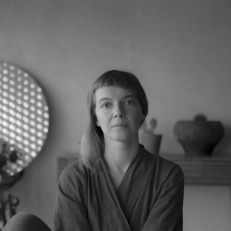
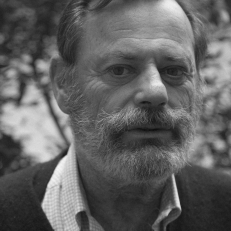
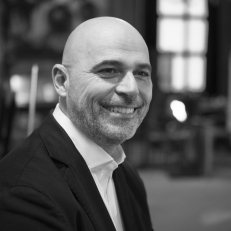
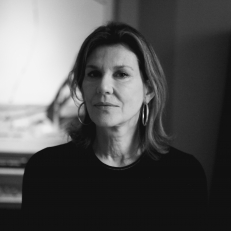
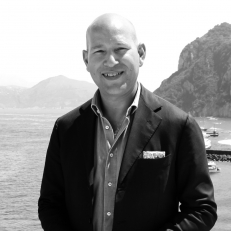
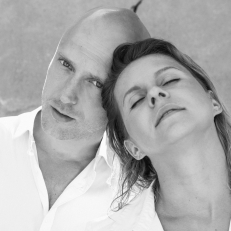
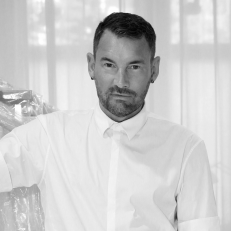
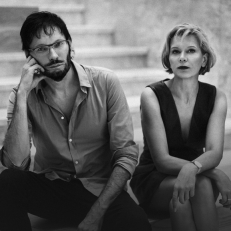
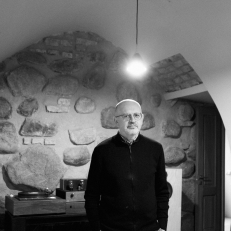
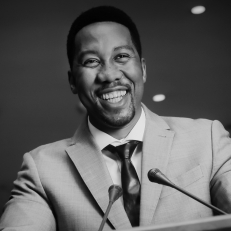


Add a comment